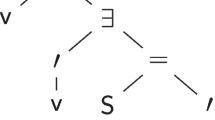Abstract
In this paper we shall review the main appraches to nonmonotonic reasoning which we classify from the perspective of their underlying logical settings as classical, intuitionistic, three-valued/partial models, and conditional. We shall be placing special emphasis on some of the prominent approaches. We shall also give hints on potential future directions and emphasize that more theoretical work is still needed before a move to application is made.
Similar content being viewed by others
References
Bell, J. (1989) Predictive Conditionals, Nonmonotonicity and Reasoning about the Future. Ph.D. Thesis, University of Essex, Colchester, UK.
Benthem, J. Van (1984) Partiality and Nonmonotonicity in Classical Logic. Center for the Study of Language and Information, Report No. CSLI-84-12.
Boolos, G. (1978) The Unprovability of Inconsistency. Cambridge University Press, London.
Clark, K. L. (1978) Negation as Failure. In Logic and Databases (eds H. Gallaire & J. Minker). Plenum Press, New York, pp. 293–322.
Davis, H. (1980) The Mathematics of Non-Monotonic Reasoning. Artificial Intelligence, 13, 73–80.
Delgrande, J. P. (1987) A First-Order Logic for Prototypical Reasoning. Artificial Intelligence, 33, 105–130.
Delgrande, J. P. (1988) An Approach to Default Reasoning Based on a First-Order Conditional Logic: Revised Report. Artificial Intelligence, 36, 63–90.
Doyle, J. (1979) A Truth Maintenance System. Artificial Intelligence. 12, 231–272.
Doyle, J. (1985) Circumscription an Implicit Definability. Journal of Automated Reasoning, 1, 391–405.
Emden, M. H. Van and Kowalski, R. A. (1976) The Semantics of Predicate Logic as a Programming Language. JACM, 23, 723–742.
Etherington, D. W. (1982) Finite Default Theories. M.Sc. Thesis, Department of Computer Science, University of British Columbia.
Etherington, D. W. (1986) Reasoning with Incomplete Information: Investigation of Non-Monotonic Reasoning. Ph.D. Thesis, Department of Computer Science, University of British Columbia.
Etherington, D. W. (1987) Relating Default Logic and Circumscription. Proceedings 10th International Conference on Artificial Intelligence. pp.489–494.
Etherington, D. W. (1988) Reasoning with Incomplete Information, Research Notes in Artificial Intelligence. Pitman, London.
Fitting, M. (1969) Intuitionistic Logic, Model Theory and Forcing. North-Holland, Amsterdam.
Gabbay, D. (1983) Intuitionistic Basis for Non-Monotonic Reasoning. In Proceedings of the Conference on Automated Deduction. Lecture Notes in Computer Science, No. 6, pp. 260–273.
Ginsberg, M. L. (ed.) (1987) Multi-valued logics. In Readings in Nonmonotonic Reasoning, Morgan Kaufmann Publishers, Inc., 252–255.
Halpern, J. & Moses, Y. (1984) Towards a Theory of Knowledge and Ignorance, Preliminary Report. Technical Report RJ 4448 48316. IBM Research Laboratory, San Jose.
Hanks, S. & McDermott, D. (1986) Default Reasoning, Non-Monotonic Logics and the Frame Problem. AAAI-86, 328–333.
Hewitt, C. (1972) Description and Theoretical Analysis (Using Schemata) of PLANNER: A Language for Proving Theorems and Manipulating Models in a Robot. AI Memo 251, MIT Project MAC, Cambridge, Mass.
Konolige, K. (1987) On the Relation between Default Theories and Autoepistemic Logic, Proceedings 10th International Conference on Artificial Intelligence, pp.394–401.
Konolige, K. (1989) On the Relation between Autoepistemic Logic and Circumscription, Proceedings 12th International Conference on Artificial Intelligence, pp.1213–1218.
Levesque, H. (1987) All I Know: An Abridged Report. AAAI-87, Seattle, WA, pp.426–431.
Lewis, D. (1973) Counterfactual. Blackwell, Oxford.
McAllester, D. A. (1978) A three-Valued Truth Maintenance System. AI Memo 473, MIT, Cambridge, Mass.
McAllester, D. A. (1980) An Outlook On Truth Maintenance. AI Memo 551, MIT, Cambridge, Mass.
McCarthy, J. (1977) Epistemological Problems of Artificial Intelligence. Proceedings of the Fifth International Joint Conference on Artificial Intelligence, 1083–1044.
McCarthy, J. (1980) Circumscription — A Form of Non-Monotonic Reasoning. Artificial Intelligence, 13, 27–39.
McCarthy, J. (1986) Application of Circumscription to Formalizing Commonsense Knowledge. Artificial Intelligence, 28, 89–116.
McDermott, D. & Doyle, J. (1980) Non-Monotonic Logic I. Artificial Intelligence, 13, 41–72.
McDermott, D. (1982) Non-Monotonic Logic II: Non-Monotonic Modal Theories. JACM, 29 (1), 35–57.
Minker, J. & Perlis, D. (1983) On the semantics of Circumscription. Technical Report, University of Maryland.
Minker, J. & Perlis, D. (1985) Circumscription: Finitary Completeness Result. Unpublished Draft, University of Maryland.
Minsky, M. (1975) A Framework for Representing Knowledge. In The Psychology of Computer Vision. (ed. P. Winston), McGraw-Hill, New York, pp.211–277.
Moore, R. (1983) Semantical Consideration of Non-Monotonic Logic, International Joint Conference on Artificial Intelligence, pp.272–279.
Moore, R. (1984) Possible World Semantics for Autoepistemic Logic. Workshop on Non-Monotonic Reasoning, New Paltz, New York, pp.344–354.
Moore, R. (1985) Semantical Consideration of Nonmonotonic Logic. Artificial Intelligence, 25, 75–94.
Obeid, N. (1987) Towards a Model of Information Growth. Ph.D. Thesis, Department of Computer Science, University of Essex, Colchester, UK.
Obeid, N. (1989) Partial Models Basis for Non-monotonic Reasoning, Research Note CSM-140. Department of Computer Science, University of Esex, Colchester, UK.
Perlis, D. & Minker, J. (1986) Completeness Results for Circumscription, Artificial Intelligence, 28, 29–42.
Poole, D. L. (1984) A Logical System for Default Reasoning. AAAI Workshop on Non-Monotonic Reasoning, NY, 373–384.
Poole, D. L. (1985) On the comparison of Theories: Preferring the Most Specific Explanation, Proceedings of the 9th International Joint Conference on Artificial Intelligence, pp.144–147.
Poole, D. L. (1988) A Logical Framework for Default Reasoning, Artificial Intelligence, 36, 27–47.
Reiter, R. (1978) On Closed-World Data Bases. In Logic and Data Bases (eds H. Gallaire & J. Minker), Plenum Press, New York, pp. 55–76.
Reiter, R. (1980) A Logic for Default Reasoning. Artificial Intelligence, 13, 81–132.
Reiter, R. (1982) Circumscription Implies Predicate Completion (Sometimes). Proceedings of the American Association for Artificial Intelligence, pp. 418–420.
Shepherdson, J. (1984) Negation as Failure: A Comparison of Clark's Complete Data Base and Reiter's Closed-World Assumption. Journal of Logic Programming, 1, 51–79.
Shoham, Y. (1987) Nonmonotonic Logics: Meaning and Utility. Proceedings of the 10th International Conference on Artificial Intelligence, pp. 388–393.
Shoham, Y. (1988) Reasoning about Change: Time and Causation from the Standpoint of Artificial Intelligence, MIT Press, Cambridge, MA.
Stalnaker, R. (1981) A Note on Non-monotonic Modal Logic. Unpublished Manuscript, Department of Philosophy, Cornell University.
Touretzky, D. S. (1986) The Mathematics of Inheritance Systems. Pitman, London.
Turner, R. (1984) Logics for Artificial Intelligence. Ellis Horwood Limited, Chichester. pp. 59–76.
Author information
Authors and Affiliations
Rights and permissions
About this article
Cite this article
Obeid, N., Turner, R. Logical foundations of nonmonotonic reasoning. Artif Intell Rev 5, 53–70 (1991). https://doi.org/10.1007/BF00129535
Issue Date:
DOI: https://doi.org/10.1007/BF00129535




